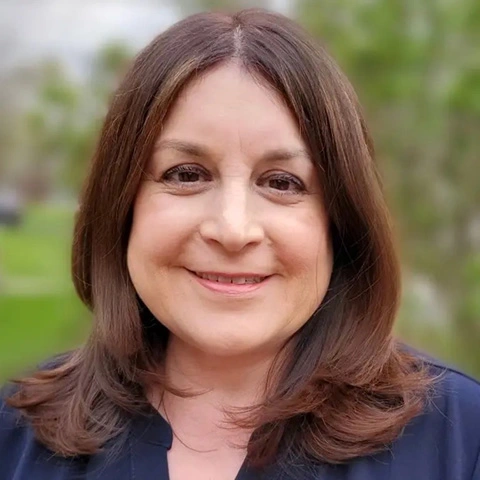Michele was diagnosed with asthma at a young age. Her asthma was not always well controlled, and she has many memories of medical visits and asthma treatments growing up. These memories helped shape her path in life, inspiring her to become a Registered Respiratory Therapist (RRT) so that she could care for and educate others also living with asthma or other lung diseases. Even with Michele’s extensive knowledge of respiratory diseases and experience of growing up with asthma, her severe bout with respiratory syncytial virus (RSV) took her by surprise. She shared her experience with us.
What were your first symptoms?
It was the first weekend of December, and I went to an outdoor German festival to enjoy food and festivities. It was a fun event, though I felt a bit worn out. The next day, I was hit hard with a respiratory infection and was down for the count. I thought I might be trying to do too much and so I rested, hoping to feel better soon. But on Wednesday, I couldn’t get out of bed. This is when symptoms including fever, cough, mucus production, vomiting and diarrhea began. On Thursday, my husband became genuinely concerned and took me to the hospital.
What happened when you got to the hospital?
I couldn’t keep anything down and I was barely functioning. As soon as I got to the hospital, they started me on IV fluids because I was so dehydrated. They tested me for RSV, and it came back positive. I also had an X-ray that showed pneumonia, so they started treating that as well. It wasn’t long after they hooked me up to an IV and gave me antibiotics (for the pneumonia, not the RSV) and fluids, breathing treatments, stuff to calm my stomach and my fever that I started feeling a bit better.
I spent six days in the hospital and that entire time I was in isolation—a room where people had to put on gowns, gloves and masks before coming in to care for me. It was lonely. My friends couldn’t come to visit me, although my husband came every day to keep me company. When I started to feel better and was able to sit up in bed, the isolation got quite frustrating. Eventually, I could walk the room, but I couldn’t walk the hall because I had to stay in my room due to having this infectious lung disease. I kept thinking about everything we’ve just been though with the pandemic. Everyone at the hospital was great, and understandably being really cautious, and that’s good, but being isolated was still difficult. It’s not like a broken leg where somebody can just knock on the door, stop in and chat with you for a minute. Thank goodness for phones and video conferencing to communicate with the outside world.
Nobody wants to go to the hospital. And nobody wants to go to the doctor. But you must know when to go and get the care you need so you can get better. I was fortunate that I was in the hospital for six days and then able to finish healing at home. Recovering from being that sick was slow going, but I was able to start working a little bit from home not long after I returned from the hospital. It took me over a month to feel like I was getting my strength back though.
Any advice on living with Asthma and risk of RSV?
If you have a lung disease and you get RSV, for other people it might just be a head cold, but if you have asthma, it can quickly become more serious and lead to other secondary infections. I got pneumonia after contracting RSV, and it took me out most of December. I had so many holiday plans that were postponed or cancelled. I’m a respiratory therapist, and I know RSV can be serious, but I wasn’t expecting it to impact me the way that it did. I don’t think most people living with chronic lung disease realize how an RSV infection can impact their lives. I didn’t.
RSV Prevention
Each year in the United States, there are an estimated 60,000-120,000 older adults hospitalized and 6,000-10,000 die from RSV infection. There are steps you can take to lower your risk of severe RSV:
- If you live with a chronic lung disease, such as asthma, work with your healthcare team to stay well controlled so your lungs can better heal from infectious respiratory diseases.
- When possible, stay away from individuals who are sick with respiratory infections to reduce your chance of becoming ill.
- Wash your hands often and try not to touch your face with unwashed hands as that is a common route for infections to occur.
- Keep up to date on all recommended vaccinations. Ask your healthcare provider to review your vaccination history if you are unsure.
“I know how important it is, living with asthma, to reduce my likelihood of getting sick with a respiratory infection,” Michele shared. “If there is a way to help prevent getting that sick again, I’m in.”
You can learn more at Lung.org/rsv
This blog was developed in partnership with GSK.
Blog last updated: October 23, 2025



